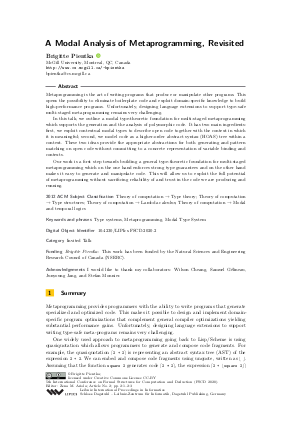A Modal Analysis of Metaprogramming, Revisited (Invited Talk)
Author
Brigitte Pientka 
-
Part of:
Volume:
5th International Conference on Formal Structures for Computation and Deduction (FSCD 2020)
Part of: Series: Leibniz International Proceedings in Informatics (LIPIcs)
Part of: Conference: Formal Structures for Computation and Deduction (FSCD) - License:
 Creative Commons Attribution 3.0 Unported license
Creative Commons Attribution 3.0 Unported license
- Publication Date: 2020-06-28
File

PDF
LIPIcs.FSCD.2020.2.pdf
- Filesize: 261 kB
- 3 pages
Document Identifiers
Subject Classification
ACM Subject Classification
- Theory of computation → Type theory
- Theory of computation → Type structures
- Theory of computation → Lambda calculus
- Theory of computation → Modal and temporal logics
Keywords
- Type systems
- Metaprogramming
- Modal Type System
Metrics
- Access Statistics
-
Total Accesses (updated on a weekly basis)
0Document
0Metadata
Abstract
Metaprogramming is the art of writing programs that produce or manipulate other programs. This opens the possibility to eliminate boilerplate code and exploit domain-specific knowledge to build high-performance programs. Unfortunately, designing language extensions to support type-safe multi-staged metaprogramming remains very challenging. In this talk, we outline a modal type-theoretic foundation for multi-staged metaprogramming which supports the generation and the analysis of polymorphic code. It has two main ingredients: first, we exploit contextual modal types to describe open code together with the context in which it is meaningful; second, we model code as a higher-order abstract syntax (HOAS) tree within a context. These two ideas provide the appropriate abstractions for both generating and pattern matching on open code without committing to a concrete representation of variable binding and contexts. Our work is a first step towards building a general type-theoretic foundation for multi-staged metaprogramming which on the one hand enforces strong type guarantees and on the other hand makes it easy to generate and manipulate code. This will allow us to exploit the full potential of metaprogramming without sacrificing reliability of and trust in the code we are producing and running.
Cite As Get BibTex
Brigitte Pientka. A Modal Analysis of Metaprogramming, Revisited (Invited Talk). In 5th International Conference on Formal Structures for Computation and Deduction (FSCD 2020). Leibniz International Proceedings in Informatics (LIPIcs), Volume 167, pp. 2:1-2:3, Schloss Dagstuhl – Leibniz-Zentrum für Informatik (2020)
https://doi.org/10.4230/LIPIcs.FSCD.2020.2
BibTex
@InProceedings{pientka:LIPIcs.FSCD.2020.2,
author = {Pientka, Brigitte},
title = {{A Modal Analysis of Metaprogramming, Revisited}},
booktitle = {5th International Conference on Formal Structures for Computation and Deduction (FSCD 2020)},
pages = {2:1--2:3},
series = {Leibniz International Proceedings in Informatics (LIPIcs)},
ISBN = {978-3-95977-155-9},
ISSN = {1868-8969},
year = {2020},
volume = {167},
editor = {Ariola, Zena M.},
publisher = {Schloss Dagstuhl -- Leibniz-Zentrum f{\"u}r Informatik},
address = {Dagstuhl, Germany},
URL = {https://drops.dagstuhl.de/entities/document/10.4230/LIPIcs.FSCD.2020.2},
URN = {urn:nbn:de:0030-drops-123242},
doi = {10.4230/LIPIcs.FSCD.2020.2},
annote = {Keywords: Type systems, Metaprogramming, Modal Type System}
}
Author Details
Funding
- Pientka, Brigitte: This work has been funded by the Natural Sciences and Engineering Research Council of Canada (NSERC).
Acknowledgements
I would like to thank my collaborators: Wilson Cheang, Samuel Gélineau, Junyoung Jang, and Stefan Monnier.
References
-
Andrew Cave and Brigitte Pientka. Programming with binders and indexed data-types. In 39th ACM SIGPLAN-SIGACT Symposium on Principles of Programming Languages (POPL'12), pages 413-424. ACM Press, 2012.

- Rowan Davies and Frank Pfenning. A modal analysis of staged computation. Journal of the ACM, 48(3):555-604, 2001. URL: https://doi.org/10.1145/382780.382785.
-
Aleksandar Nanevski, Frank Pfenning, and Brigitte Pientka. Contextual modal type theory. ACM Transactions on Computational Logic, 9(3):1-49, 2008.

-
Brigitte Pientka. A type-theoretic foundation for programming with higher-order abstract syntax and first-class substitutions. In 35th ACM SIGPLAN-SIGACT Symposium on Principles of Programming Languages (POPL'08), pages 371-382. ACM Press, 2008.

-
Brigitte Pientka, Andreas Abel, Francisco Ferreira, David Thibodeau, and Rebecca Zucchini. A type theory for defining logics and proofs. In 34th IEEE/ ACM Symposium on Logic in Computer Science (LICS'19), pages 1-13. IEEE Computer Society, 2019.

-
Brigitte Pientka and Andrew Cave. Inductive Beluga:Programming Proofs (System Description). In 25th International Conference on Automated Deduction (CADE-25), Lecture Notes in Computer Science (LNCS 9195), pages 272-281. Springer, 2015.

-
Brigitte Pientka and Joshua Dunfield. Programming with proofs and explicit contexts. In ACM SIGPLAN Symposium on Principles and Practice of Declarative Programming (PPDP'08), pages 163-173. ACM Press, 2008.

-
Brigitte Pientka and Joshua Dunfield. Beluga: a framework for programming and reasoning with deductive systems (System Description). In Jürgen Giesl and Reiner Haehnle, editors, 5th International Joint Conference on Automated Reasoning (IJCAR'10), Lecture Notes in Artificial Intelligence (LNAI 6173), pages 15-21. Springer, 2010.

